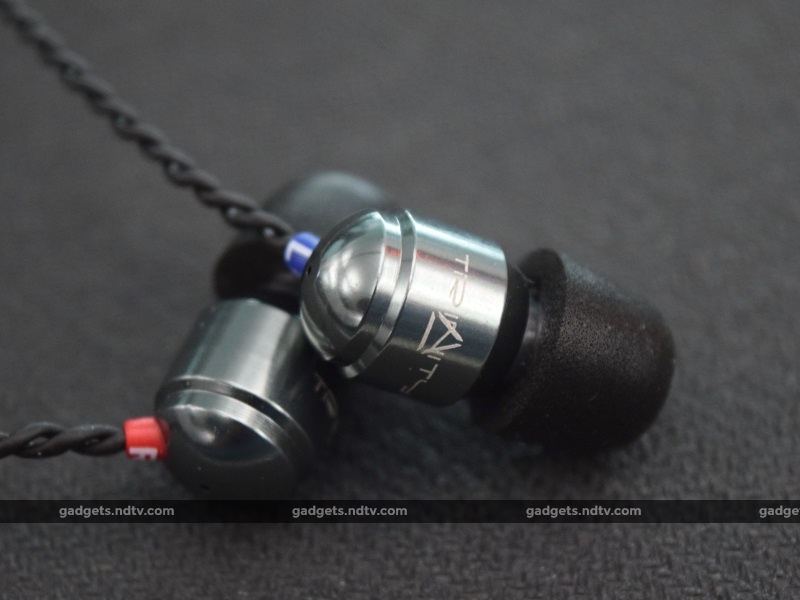- Home
- Tv
- Tv Reviews
- Trinity Audio Delta Review: Fighting the Hybrid Fight
Trinity Audio Delta Review: Fighting the Hybrid Fight

After the Fidue A73, Fidue A83 and Rock Jaw Kommand, the next pair of dual-driver hybrid in-ears we're reviewing is the Trinity Audio Delta. Like Rock Jaw, Trinity Audio is a British company. It has raised funds and popularised its products using crowdfunding website Kickstarter. Sitting at the top of a three-product range, the £90 (approximately Rs. 9,132) Delta is the company's flagship headset. Can this British upstart make a serious mark on the crowded in-ear market? Let's find out.
Specifications, design and comfort
The Trinity Audio Delta is a dual-driver hybrid headset, combining the talents of a single balanced armature driver and an 8mm neodymium dynamic driver in each ear casing. Frequency response ranges from 19-21,000Hz, sensitivity is rated at 110dB, and impedance measures in at 16Ohms. The headset has a 1.2m cable, and an interchangeable tuning filter system with three distinct filters, similar to what we first saw on the Rock Jaw Alfa Genus. The lower half of the frequency range is handled by the dynamic driver, while the upper half is powered by the balanced armature driver.
The Delta review unit sent to us did not have an in-line remote and microphone, but Trinity Audio does have a model with those included, which sells for £95. A total of six ear-tips are included in the box, including doubled-flanged and foam options. A storage case, legacy adapter, shirt clip and small steel tube to store the extra filters have also been included in the sales package.
When it comes to looks and build, the Trinity Audio Delta is absolutely stunning. The ear casings are single pieces of metal with a dull silver finish and a logo on the top. They're incredibly small and compact for casings that contain two distinct drivers, and are incredibly well designed in that sense. The 'L' and 'R' markings are on small plastic bits right where the cables enter the casings, while the tuning filters are also made of metal. On the whole, the Delta is beautifully compact and well built.
The cable, Y-splitter and 3.5mm pin are equally beautiful. The metal bits are tough and sturdy, while the 3.5mm pin has an additional spring right where the cable connects with it to allow some flex while keeping the cable from staying bent. Although the cable is rubber, it's twisted and braided into a pattern that gives you the impression that it's fabric. This also keeps it strong and resistant to strain. However, it's extremely tangle-prone and susceptible to cable-noise above the Y-splitter.
Fit is excellent as well, especially since so many ear tips have been included in the package. The foam ear tips offered the best fit in our opinion, but if you prefer silicone tips then there are plenty of those included as well. The earphones are light and comfortable to wear as a result. As we've already stated, there is some cable noise, so you might want to find a way to clip the cable to your clothing if you intend to use the headset while working out.
Performance
The Trinity Audio Delta uses an interchangeable tuning filter system with three distinct filters, called Fun (silver), Smooth (gun-metal grey) and Vivid (purple). The Fun filter offers a V-shaped signature with boosted bass and treble. Smooth is also V-shaped but tends to be more neutral with less dramatic boosts. Vivid has reduced bass and boosted mids and highs. Offering three distinct sounds, the filters make all the difference in setting the Delta up to your needs.
We tested the Trinity Audio Delta with an Android smartphone, Windows laptop and our reference Fiio X1 high-resolution audio player. Focus tracks for the review were Frey's Love Like This (Fun filter), Bonobo's Days To Come (Smooth filter) and Michael Jackson's Smooth Criminal (Vivid filter).
We started with the silver 'Fun' filter, which offers a sound signature suited to bass-heads and anyone looking for a bit of excitement in their tunes. With Love Like This playing, we were treated to a rich, thumping bass response that never felt excessive at any point. It left enough room for the detail and the tone in the lows to shine through comfortably, while also gently boosting the treble and highs for a bit of sparkle. The mids felt a bit subdued, but that is the point of this filter. There is plenty of attack and drive across the range, and the Delta succeeds in boosting the more exciting ranges without losing out on any clarity or definition.
Moving on to the grey 'Smooth' filter, we were treated to a mostly neutral sound with just a bit of boost at both ends of the frequency range. Days To Come's strong bass notes were a bit less pronounced than when we used the silver filter, but were strong nonetheless. The midrange definitely felt a bit more defined, as well. This filter helped highlight just how detailed and tonally balanced the Delta is. While soundstaging might not seem as strong, imaging is absolutely spot on, with an excellent sense of depth.
Finally, we played Smooth Criminal with the purple 'Vivid' filters on. There was a distinct drop in the bass thump and low tones, which felt a bit evident and forced. There was a noticeable boost in the upper-mid range and highs, as well as a bit of sharpness at the top of the range. Although this wasn't unbearably sharp, it stood out a bit due to the lack of a balancing effect from the lows. While the sound with the Vivid filters isn't bad, it's definitely the least exciting and defined of the three.
The silver and grey filters put the dynamic drivers to heavy use, while also suitably utilising the balanced armature driver. The two work well together, although it isn't quite as easy to hear the distinctions in the two sounds as it is with the Fidue A73 and Rock Jaw Kommand. However, the armature drivers create an excellent sense of fluidity and flow in the music, which is among the best we've heard on in-ears.
On the other hand, the purple filters tend to mute the talents of the dynamic drivers and rely primarily on the armature drivers. There isn't anything inherently wrong with the armature drivers' sound itself, but the lack of support from the dynamic drivers makes for an average sonic signature that we didn't really enjoy. We found that between the silver and grey filters, most genres of music were handled admirably.
Verdict
This is the fourth pair of hybrid-driver earphones we've reviewed recently, and the technology is yet to disappoint us. The Trinity Audio Delta implements the idea of using balanced armature and dynamic drivers together capably and efficiently. Although the excitement and drive of the Fidue A73 and Rock Jaw Kommand aren't quite matched, there is definitely more fluidity and flow to the music, and a more accurate mid-range when using the grey filters.
The Trinity Audio Delta also has the advantage of being slightly less expensive than the Rock Jaw Kommand, while improving upon build quality and design in some ways. It's compact, light and comfortable to wear, and a wide variety of ear tips will ensure that fit is not a problem. Its only weaknesses are average performance with the purple filters, a tangle-prone cable, and a bit of cable noise.
Judged purely on sound, the Trinity Audio Delta comes close to the quality offered by both the Rock Jaw Kommand and the Fidue A73, but falls just short. However, as an overall package the Delta is a more sensible option, seeing as it offers more in terms of accessories, build quality and design. It's a stellar product that deserves all the attention it gets and more. The Trinity Audio Delta can be bought here and ships worldwide.
Price (online): £90 (approximately Rs. 9,200, not including import duties and taxes)
- Excellent build and design
- Compact and comfortable
- Interchangeable tuning filters
- Fluidity, detail and tone are fantastic
- Sturdy cable
Cons
- Cable tangles easily and is noise-prone
- Average sound with the purple filter
Ratings (Out of 5)
- Design: 5
- Performance: 4.5
- Value for money: 4.5
- Overall: 4.5
Catch the latest from the Consumer Electronics Show on Gadgets 360, at our CES 2026 hub.
Related Stories
- Samsung Galaxy Unpacked 2025
- ChatGPT
- Redmi Note 14 Pro+
- iPhone 16
- Apple Vision Pro
- Oneplus 12
- OnePlus Nord CE 3 Lite 5G
- iPhone 13
- Xiaomi 14 Pro
- Oppo Find N3
- Tecno Spark Go (2023)
- Realme V30
- Best Phones Under 25000
- Samsung Galaxy S24 Series
- Cryptocurrency
- iQoo 12
- Samsung Galaxy S24 Ultra
- Giottus
- Samsung Galaxy Z Flip 5
- Apple 'Scary Fast'
- Housefull 5
- GoPro Hero 12 Black Review
- Invincible Season 2
- JioGlass
- HD Ready TV
- Laptop Under 50000
- Smartwatch Under 10000
- Latest Mobile Phones
- Compare Phones
- OPPO Reno 15 FS
- Red Magic 11 Air
- Honor Magic 8 RSR Porsche Design
- Honor Magic 8 Pro Air
- Infinix Note Edge
- Lava Blaze Duo 3
- Tecno Spark Go 3
- iQOO Z11 Turbo
- Lenovo Yoga Slim 7x (2025)
- Lenovo Yoga Slim 7a
- Lenovo Idea Tab Plus
- Realme Pad 3
- Moto Watch
- Garmin Quatix 8 Pro
- Haier H5E Series
- Acerpure Nitro Z Series 100-inch QLED TV
- Asus ROG Ally
- Nintendo Switch Lite
- Haier 1.6 Ton 5 Star Inverter Split AC (HSU19G-MZAID5BN-INV)
- Haier 1.6 Ton 5 Star Inverter Split AC (HSU19G-MZAIM5BN-INV)







![[Sponsored] Haier C90 OLED TV | Dolby Vision IQ, 144Hz OLED and Google TV in Action](https://www.gadgets360.com/static/mobile/images/spacer.png)









